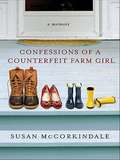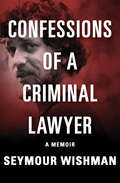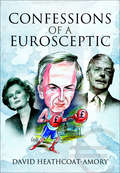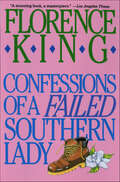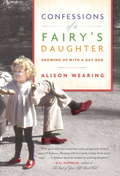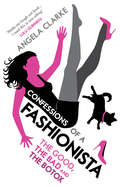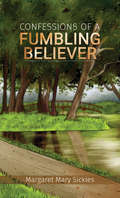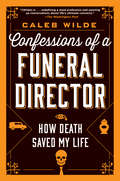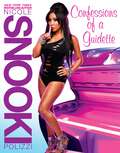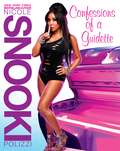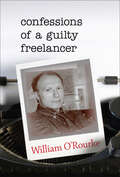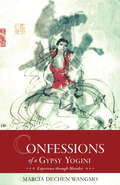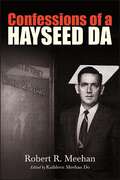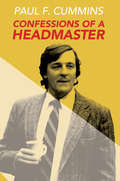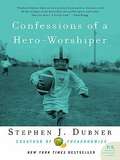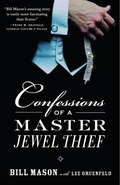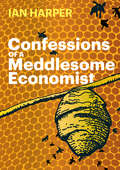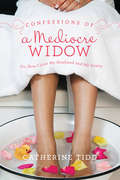- Table View
- List View
Confessions of a Christian Mystic: Discovering The Divine On The Labyrinth Journey
by River JordanFrom the author of Praying for Strangers and four Southern gothic novels comes a chronicle of faith and spirituality that is personal, raw, wise, revelatory - and very funny.With a unique mix of passionate revelation and quirky humor, River Jordan takes us on a journey through her Southern childhood to her present-day life as a novelist. Her stories run the gamut from dancing disco nights and midnight desert rides to surprise visitations with the Divine. Included are comforting letters to personal friends and loved ones about faith, death, heartbreaks and their futures. Confessions of a Christian Mystic is a highly original work about an extraordinary faith that never loses touch with current culture or everyday realities. Jordan invites us to join in on her wild ride searching for the holy mysteries of God. This haunting work will leave you deeply comforted and full of hope. Hailed as "a book for our times," Confessions gently leads us closer to that Divine mystery that shapes us and gives us life.
Confessions of a Conservative
by Garry WillsPart autobiographical account and part essay on the subject of politics, written by on Garry Willis -- one of America's best political writers.
Confessions of a Counterfeit Farm Girl
by Susan MccorkindaleA laugh-out-loud memoir about a city slicker who discovers that Manolos and manure just don?t mix. At her husband?s prompting, suburban mom and New York career woman Susan McCorkindale agreed to give up her stressful six-figure job. Together, they headed down south to a 500-acre beef farm, and never looked back. Well, he didn?t look back. She did. A lot. From playing ?spot the religious billboard? on the drive to rural Virginia, to adapting to a world without Starbucks, to planning bright-orange hunter-resistant wardrobes for the kids (?We moved here to get away from the madness of Manhattan only to risk getting popped on our own property?), this is her hilarious account of how a city girl came to love?or at least tolerate?country life. .
Confessions of a Criminal Lawyer: A Memoir
by Seymour WishmanA successful former defense attorney exposes the raw truth about the courtroom &“game&” and a career spent defending the guiltyAs an advocate for the accused in Newark, New Jersey, criminal lawyer Seymour Wishman defended a vast array of clients, from burglars and thieves to rapists and murderers. Many of them were poor and undereducated, and nearly all of them were guilty. But it was not Wishman&’s duty to pass moral judgment on those he represented. His job was to convince a jury to set his clients free or, at the very least, to impose the most lenient punishment permissible by law. And he was very good at his job. Reveling in the adrenaline rush of &“winning,&” Wishman gave no thought to the ethical considerations of his daily dealings . . . until he was confronted on the street by a rape victim he had humiliated in the courtroom. A fascinating, no-holds-barred memoir of his years spent as &“attorney for the damned,&” Wishman&’s Confessions of a Criminal Lawyer is a startling and important work—an eye-opening, thought-provoking examination of how the justice system works and how it should work—by an attorney who both defended and prosecuted those accused of the most horrific crimes.
Confessions of a Dangerous Mind: An Unauthorized Autobiography
by Chuck BarrisAutobiography of creator of game shows including The Dating Game and The Gong Show.
Confessions of a Eurosceptic
by David Heathcoat-AmoryThe former politician details his career while offering an insider&’s look at Britain&’s European involvement in the 1980s and &‘90s in this personal memoir. Few are better placed to write on Britain's relations with the European Union than David Heathcoat-Amory. In describing his own journey from initial enthusiasm for a Common Market to rejection of the EU, he gives an insider&’s view of the delusions and deceits which surround the European question. As a Member of Parliament, Minister of State and Privy Councillor, Heathcoat-Amory witnessed two prime Ministers wresting with the &‘elephant in the room&’. He describes Margaret Thatcher&’s struggles against EU control and the clashes with cabinet colleagues which split the Conservative Party and brought her down. Under John Major, David Heathcoat-Amory played a pivotal role in the parliamentary battles over the Maastricht Treaty. As Minister of State for Europe he was intimately involved in keeping Britain out of the euro, thereby avoiding the worst of the current devasting financial crisis. He resigned as Paymaster General in 1996 on a matter of principle. In Opposition, he was sent by the House of Commons to negotiate a Constitution for Europe, which he opposed with a small group of dissidents from other EU countries. As they predicted, the European Constitution was decisively rejected in referendums in France and Holland but was forced through anyway, with Blair&’s government refusing a referendum at home. The book includes a blueprint for a radically new relationship between Britain and the EU. The Author argues that, with leadership and ambition, this is now attainable, with the final decision resting with the people in a referendum.Praise for Confessions of a Eurosceptic &“An elegant memoir that outlines his euroscepticism but also touched with personal and family tragedy.&” —Total Politics &“A brisk and unpompous memoir, which incidentally makes a brisk and unpompous case against the EU.&” —Standpoint &“This book is unlike most books by politicians. With unusual clarity this book tells the story of Britain&’s European involvement since the mid-Eighties.&” —The Daily Telegraph
Confessions of a Failed Southern Lady: A Memoir
by Florence KingConfessions of a Failed Southern Lady is Florence King's classic memoir of her upbringing in an eccentric Southern family, told with all the uproarious wit and gusto that has made her one of the most admired writers in the country. Florence may have been a disappointment to her Granny, whose dream of rearing a Perfect Southern Lady would never be quite fulfilled. But after all, as Florence reminds us, "no matter which sex I went to bed with, I never smoked on the street."
Confessions of a Fairy's Daughter: Growing Up with a Gay Dad
by Alison WearingA moving memoir about growing up with a gay father in the 1980s, and a tribute to the power of truth, humour, acceptance and familial love. <P> Alison Wearing led a largely carefree childhood until she learned, at the age of 12, that her family was a little more complex than she had realized. Sure her father had always been unusual compared to the other dads in the neighbourhood: he loved to bake croissants, wear silk pyjamas around the house, and skip down the street singing songs from Gilbert and Sullivan operettas. But when he came out of the closet in the 1970s, when homosexuality was still a cardinal taboo, it was a shock to everyone in the quiet community of Peterborough, Ontario--especially to his wife and three children.<P> Alison's father was a professor of political science and amateur choral conductor, her mother was an accomplished pianist and marathon runner, and together they had fed the family a steady diet of arts, adventures, mishaps, normal frustrations and inexhaustible laughter. Yet despite these agreeable circumstances, Joe's internal life was haunted by conflicting desires. As he began to explore and understand the truth about himself, he became determined to find a way to live both as a gay man and also a devoted father, something almost unheard of at the time. Through extraordinary excerpts from his own letters and journals from the years of his coming out, we read of Joe's private struggle to make sense and beauty of his life, to take inspiration from an evolving society and become part of the vanguard of the gay revolution in Canada. <P> Confessions of a Fairy's Daughter is also the story of "coming out" as the daughter of a gay father. Already wrestling with an adolescent's search for identity when her father came out of the closet, Alison promptly "went in," concealing his sexual orientation from her friends and spinning extravagant stories about all of the "great straight things" they did together. Over time, Alison came to see that life with her father was surprisingly interesting and entertaining, even oddly inspiring, and in fact, there was nothing to hide. <P> Balancing intimacy, history and downright hilarity, Confessions of a Fairy's Daughter is a captivating tale of family life: deliciously imperfect, riotously challenging, and full of life's great lessons in love. Alison brings her story to life with a skillfully light touch in this warm, heartfelt and revelatory memoir.
Confessions of a Fashionista
by Angela ClarkeThe incredibly popular Daily Mail column, 'Confessions of a Fashionista', feeds its hungry readers snippets of a life in the glittering yet deranged world of fashion. Now its anonymous author reveals both her identity and the true story of her giddyingly glamorous time in the style industry, with insider gossip on the people who populate it. Propelled by a painful end to a relationship and determined to prove her ex wrong for breaking up with her, our Fashionista lands a place on the Harrods Graduate Scheme. A complete outsider to the fashion world, she sets out on a wing and a pair of Guccis, and finds herself in a whirlwind of couture and craziness. Along the way she learns how to stay sane in a world where hairdressers have egos as big as their clients' bouffants, where dogs fly business class, and if you're eating carbs it can only be because you're pregnant. Confessions of a Fashionista is a book for anyone who's ever been an outsider, for anyone who's ever had a relationship end badly and thought they'd never find true love, and for anyone who thinks that cakes were made to be eaten, not sniffed. By turns hilarious, sad, thrilling, romantic and fun, it is the It book for fashionistas everywhere.
Confessions of a Female Rabbi: Relevant Religion in an On-Demand World
by Rabbi Rebecca JablonskiOne of NYC's most sought-after female rabbis shares the key to keeping religion relevant in an on demand world in this tell-all guideBelieve it or not, all religions evolve and change. As church and synagogue attendance is in record decline, this young female rabbi has found a way to meet families from a variety of backgrounds in the modern world and help them connect with the traditions and practice that they crave. Rabbi Rebecca Keren Jablonski has served world-wide, bringing bespoke and creative religious experiences to those who sought spirituality outside of institutions and denominational confines. With disruptor brands changing the way we consume products and information, religion is also in need of a 3,000 year-old facelift, or at least a mini makeover. There is room in the pews for new leaders with innovative strategies and approaches to keep religion relevant and meaningful in today&’s times. Confessions of a Female Rabbi will trace the changes in our current multi-faith landscape, hone in on what&’s happening with the Jewish American community, and demonstrate through case studies how she&’s been successful delivering transformations for families through the prism of religious practice and observance. These confessions will express her unique perspective, personal and collective shortcomings, and reveal her insights as a reflective and relatable spiritual facilitator. Touching universal stories of birth, coming of age, weddings, divorce, conversion, and sacred times affirm the deeper meaning we all can find if we make space for something holy in the circle of life.
Confessions of a Fumbling Believer
by Margaret Mary SicklesOrganized religion is both lauded and scorned these days. Spirituality, rather than formal religion, is often cited as religious expression of choice. These essays combine both and examine them from the viewpoint of someone who has lived within the confines of an organized religion and who has moved away from it.
Confessions of a Funeral Director: How Death Saved My Life
by Caleb Wilde“Wise, vulnerable, and surprisingly relatable . . . funny in all the right places and enormously helpful throughout. It will change how you think about death.” —Rachel Held Evans, New York Times–bestselling author of Searching for SundayWe are a people who deeply fear death. While humans are biologically wired to evade death for as long as possible, we have become too adept at hiding from it, vilifying it, and—when it can be avoided no longer—letting the professionals take over.Sixth-generation funeral director Caleb Wilde understands this reticence and fear. He had planned to get as far away from the family business as possible. He wanted to make a difference in the world, and how could he do that if all the people he worked with were . . . dead? Slowly, he discovered that caring for the deceased and their loved ones was making a difference—in other people’s lives to be sure, but it also seemed to be saving his own. A spirituality of death began to emerge as he observed the family who lovingly dressed their deceased father for his burial; the nursing home that honored a woman’s life by standing in procession as her body was taken away; the funeral that united a conflicted community. Through stories like these, told with equal parts humor and poignancy, Wilde’s candid memoir offers an intimate look into the business of death and a new perspective on living and dying.“Open[s] up conversations about life’s ultimate concerns.” —The Washington Post“As a look behind the closed doors of the death industry, as well as a candid exploration of Wilde’s own faith journey, this book is fascinating and compelling.” —National Catholic Reporter“[A] stunner of a debut.” —Rachel Held Evans, author of Inspired
Confessions of a Guidette
by Nicole "Snooki" PolizziAmerica’s favorite pint-sized party girl and star of MTV’s Jersey Shore follows up her New York Times bestselling novel A Shore Thing with this lighthearted, full-color, guide to being a guidette—a must-have for her legions of fans. Your mission, should you choose to accept it, is to arm yourself with bronzer, a tease comb, and makeup brushes and join the Snooki Style Revolution. When guidettes march in, people notice. It&’s the attitude. The boldness. The sex appeal. The tan. The serious shortage of hairspray in the surrounding area. You have to experiment in life, or you&’ll be boring. From Nicole &“Snooki&” Polizzi&’s top twenty-five rules for being a guidette, to her smushable makeup and skin secrets, to her rules on Snookin&’ for love, Snooki&’s sickest tips and advice for friggin&’ owning it are all here, along with hundreds of full color photographs and the official Snictionary for easy reference. But that&’s not all. There&’s a lot more to the diminutive reality star than what you see on TV. Snooki shares her obsessions (her bed, Viva Glam Gaga bright pink lipstick, sci-fi movies) and some juicy behind-the-Shore secrets (which season was her favorite, what it was like to wake up in a jail cell in season two, why the house smells like alcohol and dog&’s butt). For everything else, you&’ll just have to read the book! Being a guidette princess is about being yourself, doing what you want, and trying to have a good time wherever you are. So strap yourselves in, bitches! And get ready for the ride.
Confessions of a Guidette
by Nicole Snooki" PolizziA loud, wild, cuddly and in-your-face party girl with sky-high hair and a spray tan, the pint-size Snooki has emerged as the breakout star of the wildly successful Jersey Shore. She's been parodied on Saturday Night Live, appeared on almost every major talk show (including Leno and Conan), was featured in the New York Times, and has more than 300,000 followers on Twitter. Snooki also has attracted a slew of celebrity fans, like Leo DiCaprio, Sean "Diddy" Combs, Ashton Kutcher, Demi Moore, Zach Braff and Tinsley Mortimer. This attractively designed full colour book will feature tons of photos, tips, and fascinating details from American's favourite guidette and will be a must have for fans of Snooki and Jersey Shore. * Snooki Style: The poof never dies; Waving, streaking and bangin' it - my other sick hairstyles; Why orange you tan; The guidette wardrobe - what to rock. * Guidos, Gorillas & Juiceheads: What I look for in a gorilla; Different types of gorillas; How to break up with a guido so he isn't a stage-5 cling; Warning signs that the guy is a creeper; 5 sure signs a guy isn't a guido. * How To Be a Guidette: The Guidette Pose; 12 things a guidette would never do; The Snictionary, or a Guidette's favourite words.
Confessions of a Guilty Freelancer
by William O'RourkeFrom an acclaimed writer and journalist, essays containing “a brilliant overview of American history from the 1960s to the post 9/11 era” (Maura Stanton, author of Immortal Sofa: Poems by Maura Stanton).William O’Rourke’s singular view of American life over the past 40 years shines forth in these short essays on subjects personal, political, and literary, which reveal a man of keen intellect and wide-ranging interests. They embrace everything from the state of the nation after 9/11 to the author’s encounter with rap, from the masterminds of political makeovers to the rich variety of contemporary American writing. His reviews illuminate both the books themselves and the times in which we live, and his personal reflections engage even the most fearful events with a special humor and gentle pathos. Readers will find this richly rewarding volume difficult to put down.“O’Rourke has always had his finger on the pulse of the contemporary American literary scene.” —Corinne Demas, author of The Writing Circle“With sparkling wit that never takes a vacation, [O’Rourke] is our unpaid public intellectual number one.” —Jaimy Gordon, author of Lord of Misrule, winner of the 2010 National Book Award for Fiction“O’Rourke’s . . . writing is literary, without a doubt, but his style is conversational, rhythmic and leavened by a dry sense of humor that engage the reader on an intimate level.” —South Bend Tribune“[T]hose who enjoy a good romp through some of our country’s most pivotal times in the company of an astute observer who is unafraid to offer a penetrating, and sometimes scathing, critique of the state of the nation, will find themselves well matched.” —ForeWord Reviews“O’Rourke’s descriptions of the writing life have the ring of absolute truth.” —Review of Contemporary Fiction
Confessions of a Gypsy Yogini
by Tulku Thondup Marcia Dechen WangmoConfessions of a Gypsy Yogini is a collection of teachings taken from the author's own life, gained from "experience through mistakes, learning the hard way." After an early life as a "quasiradical, hippie, horse trainer, and environmentalist," Marcia Dechen Wangmo became a Buddhist. Over the next three decades, through encounters with respected Tibetan masters and an enduring student-teacher relationship with a famed yogi, she moved deep into the hidden world of Vajrayana Buddhism.Written as a guidebook for others and presented within a Buddhist framework, Confessions offers a fresh approach to traditional teachings. The author turns an unflinching eye on her own shortcomings and painful experiences in a series of revelations proving that, despite appearances to the contrary, she has been a far from ideal student. "I confess to not eradicating ignorance from the core," she begins. Interweaving insights gained from her personal experience, step by step she draws readers closer to the fruits of Buddhist practice: the ability to see things as they truly are.From the Trade Paperback edition.
Confessions of a Gypsy Yogini
by Marcia Schmidt Thondup TulkuConfessions of a Gypsy Yogini is a tale of experience through mistakes, learning the hard way. It is a guidebook to help find ourselves, offering a fresh approach to traditional teachings in a non-adulterated way, adapted to modern characters. Presented within the Buddhist framework, it will draw the reader closer to seeing things as they truly are, assisting in ascertaining and validating our inherent beauty and combating any feeling of worthlessness while acknowledging anxiety as a part of the path. To overcome negative perceptions, we need to study our confusion and find tools to clear some of it away. Learning how to meditate begins the road to healing and training in various simple formulas directs us to becoming better people. We can meet life's challenges with humor and triumph over them.Included are several opinions of major Tibetan Teachers:Confessions of a Gypsy Yogini is a vivifying account of the ambrosia-like Buddhist path with brilliant imagery and clear voices of many renowned Masters recorded by the author, who lived at the feet of one of the greatest Tibetan Masters of meditation for 17 years at the epicenter of unfolding events of Dharma that crossed many oceans. May this volume reach many to ignite the light of love and wisdom - the true meaning of Dharma - in the hearts of many.Tulku Thondup RinpocheMarcia [Dechen Wangmo] has followed many great lamas, some of the best of this century. Her account of her experience as an American amidst this older generation of lamas is quite important for Dharma students from the West.Dzongsar Khyentse Rinpoche
Confessions of a Hayseed DA (Excelsior Editions)
by Robert R. MeehanIn the 1960s, the small county of Rockland, north of New York City, went through a period of rapid expansion. Although beneficial, this explosive growth also led to the unwelcome encroachment of crime like the county had never seen before. Enter Robert Meehan, a young, idealistic defense attorney who hatched an impossible scheme to become the first Democrat elected District Attorney of Rockland County in more than half a century. In this compelling page-turner, Meehan takes us through his journey from naive do-gooder to seasoned prosecutor, investigating and solving heinous crimes and surviving an attempt on his life that upended his family's world. This manuscript, completed in 1978, was discovered by Meehan's daughter years after his passing. She has edited the text, researched cases cited by her father, and interviewed some of the key players whose names appear within these pages.
Confessions of a Headmaster
by Paul F. Cummins&“Both a memoir and manifesto for education reform . . . chronicles [Cummins&’s] remarkable career as a teacher, headmaster, and school founder.&” —Kirkus Reviews In this entertaining and inspiring memoir, renowned educator Paul Cummins candidly shares his journey from privileged kid and ivory-tower scholar to hands-on progressive educator, working to achieve social justice through education for all youth: from children of celebrities to foster and incarcerated youth and those facing sometimes unimaginable circumstantial hurdles to education and accomplishment—proving time and again that all children can succeed given appropriate support. Confessions of a Headmaster is &“the story of the birth of the kind of open, enlightened, diverse education we all take for granted today, told in a warm and engaging way by the visionary in our midst who made it happen&” (Victoria Shorr, cofounder of the Archer School for Girls and of the Pine Ridge Girls&’ School). &“The story of a man who brought the romance back into teaching at a time when the field of education is a field of constant national controversy, and our most popular books have titles with militarist references, such as The Teacher Wars.&” —Mona Simpson, national bestselling author of Anywhere But Here &“As Paul Cummins once remarked, &‘Passion without intelligence is of limited value&’—and the inverse is also true—for who would want intelligence without passion? In Confessions, we see what can happen when these two qualities work in sync!&” —John Densmore, drummer for the Doors
Confessions of a Hero-Worshiper
by Stephen J. DubnerAs a boy, Stephen J. Dubner's hero was Franco Harris, the famed and mysterious running back for the Pittsburgh Steelers. When Dubner's father died, he became obsessed--he dreamed of his hero every night; he signed his school papers "Franco Dubner." Though they never met, it was Franco Harris who shepherded Dubner through a fatherless boyhood. Years later, Dubner journeys to meet his hero, certain that Harris will embrace him. And he is . . . well, wrong. Told with the grit of a journalist and the grace of a memoirist, Confessions of a Hero-Worshiper is a breathtaking, heartbreaking, and often humorous story of astonishing developments. It is also a sparkling meditation on the nature of hero worship--which, like religion and love, tells us as much about ourselves as about the object of our desire.
Confessions of a Knife
by Richard SelzerMerging art and religion with science, these essays delve deeply into the emotional territory of medicine commonly avoided by writers. Never hesitant to admit his own frailties, Selzer draws on his experiences as a surgeon with integrity and wit.
Confessions of a Latter-day Virgin: A Memoir
by Nicole HardyWhen Nicole Hardy's eye-opening "Modern Love" column appeared in the New York Times, the response from readers was overwhelming. Hardy's essay, which exposed the conflict between being true to herself as a woman and remaining true to her Mormon faith, struck a chord with women coast-to-coast.Now in her funny, intimate, and thoughtful memoir, Nicole Hardy explores how she came, at the age of thirty-five, to a crossroads regarding her faith and her identity. As a member of the Church of Jesus Christ of Latter-day Saints, Nicole had held absolute conviction in her Mormon faith during her childhood and throughout her twenties. But as she aged out of the Church's "singles ward" and entered her thirties, she struggled to merge the life she envisioned for herself with the one the Church prescribed, wherein all women are called to be mothers and the role of homemaker is the emphatic ideal.Confessions of a Latter-day Virgin chronicles the extraordinary lengths Nicole went to in an attempt to reconcile her human needs with her spiritual life--flying across the country for dates with LDS men, taking up salsa dancing as a source for physical contact, even moving to Grand Cayman, where the ocean and scuba diving provided some solace. But neither secular pursuits nor LDS guidance could help Nicole prepare for the dilemma she would eventually face: a crisis of faith that caused her to question everything she'd grown up believing.In the tradition of the memoirs Devotion and Mennonite in a Little Black Dress, Confessions of a Latter-day Virgin is a mesmerizing and wholly relatable account of one woman's hard-won mission to find love, acceptance, and happiness--on her own terms.
Confessions of a Master Jewel Thief: Confessions Of A Master Jewel Thief
by Bill Mason Lee GruenfeldThe extraordinarily captivating memoir of the remarkable jewel thief who robbed the rich and the famous while maintaining an outwardly conventional life--an astonishing and completely true story, the like of which has never before been told . . . or lived. Bill Mason is arguably the greatest jewel thief who ever lived. During a thirty-year career he charmed his way into the inner circles of high society and stole more than $35 million worth of fabulous jewels from such celebrities as Robert Goulet, Armand Hammer, Phyllis Diller, Bob Hope, Truman Capote, Margaux Hemingway and Johnny Weissmuller--he even hit the Mafia. Along the way he seduced a high-profile Midwest socialite into leaving her prominent industrialist husband, nearly died after being shot during a robbery, tricked both Christie's and Sotheby's into fencing stolen goods for him and was a fugitive for five years and the object of a nationwide manhunt. Yet despite the best efforts of law enforcement authorities from several states as well as the federal government, he spent less than three years total in prison. Shadowy, elusive and intensely private, Mason has been the subject of many magazine and newspaper features, but no journalist has ever come close to knowing the facts. Now, in his own words and with no holds barred, he reveals everything, and the real story is far more incredible than any of the reporters, detectives or FBI agents who pursued Mason ever imagined. Confessions of a Master Jewel Thief, expertly co-written by bestselling author Lee Gruenfeld, is a unique true-crime confessional. From the Hardcover edition.
Confessions of a Meddlesome Economist
by Ian HarperIan Harper just cannot stop meddling. During his 35-year career as a professional economist, he has worked with governments, banks, corporates and leading professional services firms at the highest level. Whether it be reviewing Australia’s competition policy, Victoria’s state finances or chairing the Australian Fair Pay Commission, he acts out of a passionate belief that economists can actually be useful.Ian’s career in economics has enabled him to participate in some of the most important debates over the future of Australia and influence some of the nation’s most talented emerging leaders. In Confessions of a Meddlesome Economist, the long-awaited revised and updated edition of his prize-winning book Economics for Life, published in 2011, Ian revisits some old debates and introduces new ones – including the purpose of place – all in the context of his professional life. There is no trace of self-indulgence or self-congratulation in this narrative, rather a thoughtful account of choices, successes and disappointments.The aim the same: to illustrate the power of good economics to improve people’s material lives and the power of the Christian faith in helping this practising economist keep his professional life in proper perspective.
Confessions of a Mediocre Widow
by Catherine TiddI spent my 11th wedding anniversary planning my husband's funeral. If I could just figure out how to make that rhyme, it would be the beginning of a great country song. Involuntarily single. That's the true story of where Catherine Tidd finds herself just three weeks after turning thirty-one. Widowed with three children under six years old, a rusty resume, no fix-it skills, and no clue how to live life as a widow, Catherine can't help but be a little exasperated with her dead husband for leaving her to deal with life on her own. Catherine's now in charge of her life in a way she never wanted to be, in a way that would have most of us reeling and numb. But she soon realizes that when you call the shots, you can make pedicures one of the stages of grief--and that moving forward might be more fun in a new sports car. Her honest Confessions of a Mediocre Widow is a glimpse into the heartbreaking and sometimes humorous world of a young woman who learns that it is possible to find joy in an unexpected life.


